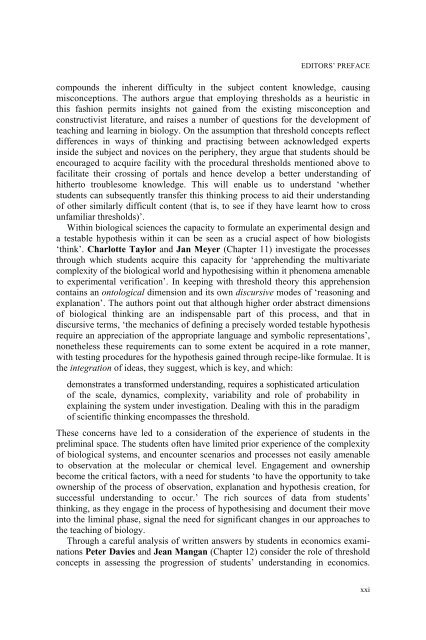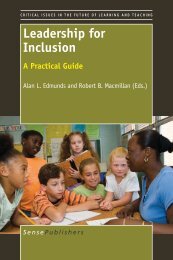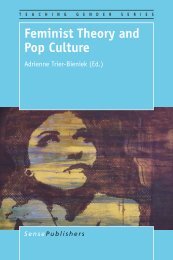1177-threshold-concepts-and-transformational-learning
1177-threshold-concepts-and-transformational-learning
1177-threshold-concepts-and-transformational-learning
- No tags were found...
Create successful ePaper yourself
Turn your PDF publications into a flip-book with our unique Google optimized e-Paper software.
EDITORS’ PREFACEcompounds the inherent difficulty in the subject content knowledge, causingmisconceptions. The authors argue that employing <strong>threshold</strong>s as a heuristic inthis fashion permits insights not gained from the existing misconception <strong>and</strong>constructivist literature, <strong>and</strong> raises a number of questions for the development ofteaching <strong>and</strong> <strong>learning</strong> in biology. On the assumption that <strong>threshold</strong> <strong>concepts</strong> reflectdifferences in ways of thinking <strong>and</strong> practising between acknowledged expertsinside the subject <strong>and</strong> novices on the periphery, they argue that students should beencouraged to acquire facility with the procedural <strong>threshold</strong>s mentioned above tofacilitate their crossing of portals <strong>and</strong> hence develop a better underst<strong>and</strong>ing ofhitherto troublesome knowledge. This will enable us to underst<strong>and</strong> ‘whetherstudents can subsequently transfer this thinking process to aid their underst<strong>and</strong>ingof other similarly difficult content (that is, to see if they have learnt how to crossunfamiliar <strong>threshold</strong>s)’.Within biological sciences the capacity to formulate an experimental design <strong>and</strong>a testable hypothesis within it can be seen as a crucial aspect of how biologists‘think’. Charlotte Taylor <strong>and</strong> Jan Meyer (Chapter 11) investigate the processesthrough which students acquire this capacity for ‘apprehending the multivariatecomplexity of the biological world <strong>and</strong> hypothesising within it phenomena amenableto experimental verification’. In keeping with <strong>threshold</strong> theory this apprehensioncontains an ontological dimension <strong>and</strong> its own discursive modes of ‘reasoning <strong>and</strong>explanation’. The authors point out that although higher order abstract dimensionsof biological thinking are an indispensable part of this process, <strong>and</strong> that indiscursive terms, ‘the mechanics of defining a precisely worded testable hypothesisrequire an appreciation of the appropriate language <strong>and</strong> symbolic representations’,nonetheless these requirements can to some extent be acquired in a rote manner,with testing procedures for the hypothesis gained through recipe-like formulae. It isthe integration of ideas, they suggest, which is key, <strong>and</strong> which:demonstrates a transformed underst<strong>and</strong>ing, requires a sophisticated articulationof the scale, dynamics, complexity, variability <strong>and</strong> role of probability inexplaining the system under investigation. Dealing with this in the paradigmof scientific thinking encompasses the <strong>threshold</strong>.These concerns have led to a consideration of the experience of students in thepreliminal space. The students often have limited prior experience of the complexityof biological systems, <strong>and</strong> encounter scenarios <strong>and</strong> processes not easily amenableto observation at the molecular or chemical level. Engagement <strong>and</strong> ownershipbecome the critical factors, with a need for students ‘to have the opportunity to takeownership of the process of observation, explanation <strong>and</strong> hypothesis creation, forsuccessful underst<strong>and</strong>ing to occur.’ The rich sources of data from students’thinking, as they engage in the process of hypothesising <strong>and</strong> document their moveinto the liminal phase, signal the need for significant changes in our approaches tothe teaching of biology.Through a careful analysis of written answers by students in economics examinationsPeter Davies <strong>and</strong> Jean Mangan (Chapter 12) consider the role of <strong>threshold</strong><strong>concepts</strong> in assessing the progression of students’ underst<strong>and</strong>ing in economics.xxi




